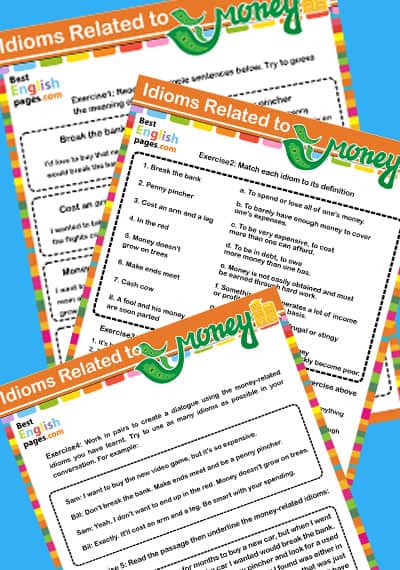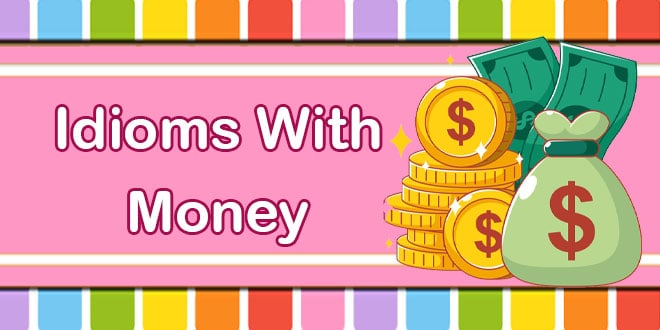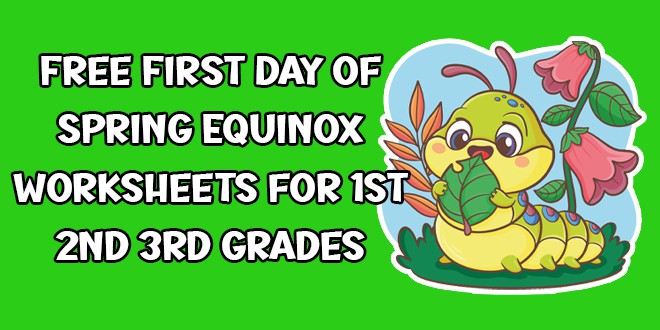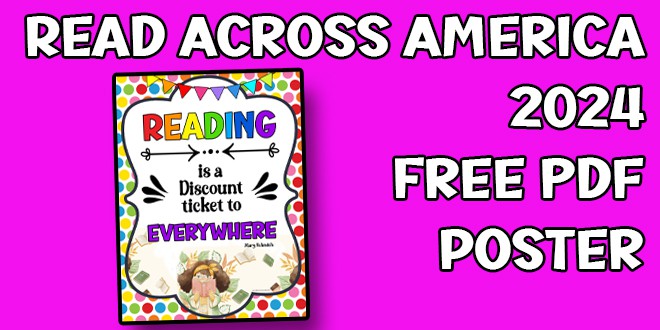As language Learners, you have probably noticed that idioms with money are everywhere. From casual conversations to business meetings, these expressions are an essential part of the English language.
But if you’re not a native speaker, understanding and using money idioms can be a real challenge.
Therefore, we have put together this guide to help you master the most common money idioms in English.
Toward the end of this article, you will find various activities related to money idioms that will help you boost your vocabulary about money.

What Are Money Idioms?
Money idioms are expressions that use financial terms and concepts to convey a meaning that is often unrelated to money itself.
For example, “cost an arm and a leg” means something is very expensive, even though it has nothing to do with limbs. Other examples of money idioms include “break the bank,” “make ends meet,” and “in the red.”
One of the most popular idioms with money is “money talks”. This idiom refers to the idea that people with money have power and influence. When we say “money talks”, we mean that money can make things happen, even if it’s not fair or just.
For example, if a wealthy person is trying to buy a property, they may be able to convince the seller to sell it to them at a lower price by offering more money. In this case, “money talks”.
Another interesting idiom related to money is “filthy rich”. This expression refers to people who are extremely wealthy. It’s thought to have originated in the 19th century when wealthy people would travel by train and their sooty clothes would give away their status.
Nowadays, we use this expression to describe people who are rich beyond imagination.
Why Learn Money Idioms?
There are several reasons why learning money idioms is important for anyone learning English.
First, these expressions are incredibly common, so you’re likely to encounter them in both formal and informal situations.
Second, using money idioms correctly can help you sound more fluent and natural when speaking English.
Finally, understanding money idioms can help you better understand English culture and the way people think about money and finances.
Popular Idioms Related to Money and Their Meanings
Here are some of the most common money idioms you’re likely to encounter in English:
Break the Bank
This idiom means that something is very expensive and can easily exceed your budget. For example: “I’d love to travel to Europe this summer, but the airfare would break the bank.”
Cash Cow
A cash cow is a business or product that generates a lot of money for its owner. For example: “That new movie franchise is a real cash cow for the studio.”
In the Red
If you’re “in the red,” it means you owe more money than you have. For example: “I can’t go out tonight because I’m in the red and need to pay off some bills.”
Make Ends Meet
To “make ends meet” means to have just enough money to cover your basic expenses. For example: “It’s tough to make ends meet on a minimum wage salary.”
Penny Pincher
A penny pincher is someone who is very frugal and doesn’t like to spend money. For example: “My grandfather is a real penny pincher. He never buys anything unless it’s on sale.”
The digital age has also brought new idioms related to money. One of the most famous is “cash me outside”.
This expression originated from a TV show in which a teenager said “catch me outside, how about that?” to an audience member.
The expression went viral and became a popular meme. Nowadays, “cash me outside” is used to mean that someone wants to get paid or wants to receive money.
30 + Popular Money Idioms You Should Know
| Idiom | Definition | Example |
|---|---|---|
| Break the bank | Spend all of one’s money, usually on a single purchase | John broke the bank buying that luxury car. |
| Cost an arm and a leg | Be extremely expensive | I can’t afford to travel by first class because it costs an arm and a leg. |
| Penny pincher | A person who is unwilling to spend money | My grandfather is a penny pincher and never buys anything unnecessary. |
| In the red | To be in debt | I’m sorry, I can’t lend you any money right now because I’m in the red myself. |
| Money doesn’t grow on trees | Money is a limited resource and should be used wisely | You can’t keep asking your parents for money all the time. Remember, money doesn’t grow on trees. |
| Make ends meet | To have enough money to cover basic expenses | With the high cost of living, it’s not easy to make ends meet. |
| Cash cow | A source of steady income | That business has become a cash cow, generating profits every year. |
| Money talks | Wealth can influence people and situations | She was able to get the best lawyers because money talks. |
| Tighten your belt | To reduce spending in order to save money | I need to tighten my belt this month because I have a lot of bills to pay. |
| A fool and his money are soon parted | A foolish person spends money carelessly and quickly | Jack lost all his savings by investing in a pyramid scheme. A fool and his money are soon parted. |
| Idiom | Definition | Example |
| Do it on a dime | To do something on a small budget | We had a great time on vacation even though we did it on a dime. |
| Rolling in dough | To be very wealthy | After hitting the jackpot at the casino, he was rolling in dough. |
| Burn a hole in one’s pocket | Money that is burning a hole in one’s pocket is money that one is eager to spend | She got her paycheck today and it’s burning a hole in her pocket. |
| Cash on the barrelhead | Payment in full at the time of purchase | I don’t like to use credit cards. I prefer to pay cash on the barrelhead. |
| Get your money’s worth | To receive good value for the money you spend | I always try to negotiate a good deal so that I get my money’s worth. |
| Money to burn | Having more money than one needs | He’s got money to burn, he can afford to take a year off and travel the world. |
| Put your money where your mouth is | To support one’s opinion with one’s own money | If you really believe in that startup, then put your money where your mouth is and invest in it. |
| Spare no expense | To spend as much money as necessary | The bride’s father spared no expense on her wedding, it was like a fairy tale. |
| Throw money at a problem | To use money as a solution to a problem, without considering other options | The company was losing customers, so they threw money at the problem and launched a big advertising campaign. |
| Two cents | An opinion or comment that is not valued | I don’t care about his two cents, he doesn’t know what he’s talking about. |
| Pay through the nose | To pay a high price | I had to pay through the nose to get that rare book, but it was worth it. |
| Loaded | To be rich or have a lot of money | She’s loaded, she can afford to buy whatever she wants. |
| Idiom | Definition | Example |
|---|---|---|
| Shell out | To pay for something | I had to shell out $200 for a new pair of shoes. |
| Feather one’s nest | To accumulate wealth for oneself | He’s been feathering his nest with his high-paying job. |
| Pin money | Small amount of money for personal expenses | She uses her pin money to buy herself a latte every day. |
| Tightwad | Someone who is reluctant to spend money | My grandfather is a tightwad who never buys anything he doesn’t absolutely need. |
| Loaded | Very wealthy | He must be loaded if he can afford to buy a new car every year. |
| Pay through the nose | To pay an exorbitant amount of money for something | I had to pay through the nose for that concert ticket, but it was worth it. |
| Cash in | To make a profit or receive a reward | She cashed in on her investments and retired early. |
| Live within one’s means | To spend no more than one earns | He learned to live within his means after running up a lot of debt. |
| Money to burn | To have more money than one needs | She’s got money to burn if she can afford to take a vacation every month. |
| Rainy day | A time when money might be needed unexpectedly | I’m saving this money for a rainy day in case I lose my job. |
| Skim off the top | To take a portion of money illegally or without permission | The corrupt politician was skimming off the top of the government funds. |
How to Use Money Idioms
Using money idioms correctly can be a bit tricky, but there are a few tips that can help.
First, make sure you understand the meaning of the idiom in context. Second, practice using the idiom in a sentence until it feels natural.
Finally, try to use the idiom in conversation with native speakers to get feedback on your pronunciation and usage.
Mastering money idioms is an important step in becoming fluent in English. By understanding and using these expressions correctly, you can communicate more effectively and sound more natural in your conversations. So don’t be afraid to start incorporating money idioms into your vocabulary today.
Money Idioms Worksheet Pdf Free Download







Leave a Reply